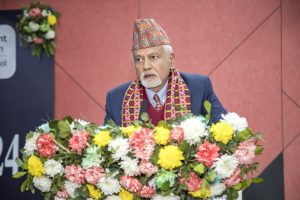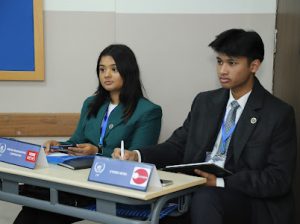Niranjan Man Singh Basnyat

Former Ambassador
(18 February 2024)
Begin text.
First of All, I  would like to express my sincere thanks to organizers for having me as Chief Guest at today’s concluding session. I would like to briefly talk about the problems faced by the people all over the world due to climate change and also share my experiences as a diplomat.
would like to express my sincere thanks to organizers for having me as Chief Guest at today’s concluding session. I would like to briefly talk about the problems faced by the people all over the world due to climate change and also share my experiences as a diplomat.
The recent data on climate change indicates that there is an alarming situation facing this earth. Global warming has increased with the rise of one degree celsius every year. In Nepalese mountains, it even surpassed at the increased rate of 1.5 degree celsius.
It has decreased the productivity in agriculture in the mountains as well as triggered many weather disasters such as flash floods, landslides and cyclones etc. Water sources are drying up in many countries including in Nepal. The “polluters pay” principle needs to be applied strictly at the international level. According to an estimate, the world’s 10 percent rich countries are responsible for 50 percent of GreenHouse Gas (GHG) emissions.
Those who are least responsible for pollution such as Nepal should not be punished at the same rate as these rich countries. Biggest polluters must reduce their carbon emissions and contribute to amelioration of world climate and environment.
Nepal is suffering from the melting of snow at the high rate in the Himalayas, rightly called the Third Pole, thus contributing to the world’s climate change. In this writer’s opinion, climate change is not a local problem only, but it has a global dimension, so it must be tackled at the international level with adequate financial and human resources.

Following is a list of biggest polluters of the world (2019):
1 China, with more than 10,065 million tons of CO2 released.
2 United States, with 5,416 million tons of CO2.
3 India, with 2,654 million tons of CO2.
4 Russia, with 1,711 million tons of CO2.
online pharmacy https://familyvoicesal.org/documents/Tip_Sheets/pdf/estrace.html with best prices today in the USA
buy bimatoprost online http://patersoncounseling.org/images/photoalbum/jpg/bimatoprost.html no prescription pharmacy
5 Japan, 1,162 million tons of CO2.
6 Germany, 759 million tons of CO2.
7 Iran, 720 million tons of CO2.
8 South Korea, 659 million tons of CO2
9 Saudi Arabia, 621 million tons of CO2.
10 Indonesia, 615 million tons of CO2.
From above, it is estimated that every year more than 30 giga-tons of CO2 are released into the Earth’s atmosphere, which is the main cause of the greenhouse gas effects that contribute to climate change. In this context, the rich developed countries should also support countries like Nepal (sandwiched between the first biggest polluter China and the third biggest polluter India) in their efforts to mitigate the pollution and improve their environment.

The continuous increase in population is one of the major reasons for pollution in the world. High rate of Desertification and deforestation at the massive scale, and human encroachment to the habitat of wild animals are also other major concerns. The COP 28 of Climate Change Conference which was held from 30 November to 12 December 2023 in Dubai, UAE discussed the entire issues of climate change and assist developing countries with a concrete plan of action. In this connection, we must have courage to name main two countries i. e. China and India in the international forums and ask for compensation from them for the environmental degradation in Nepal. Actually these countries are major contributors to pollution in Nepal particularly the fast melting of the snow in the high Himalayas and burst of glaciers. The effective implementation of National Adaptation Plan is also an important tool for the solution of the problems. Nepal has committed to achieving net-zero greenhouse emissions by 2045.

Nepal requires to vigorously pursue development diplomacy and economic diplomacy which are more and more important apparatus to graduate from a LDC to a level of a developing country by 2026.
Similarly, Nepal needs to develop a competent cadre of economic diplomats to pursue such diplomacy as early as possible.
As I worked at the Permanent of Mission of Nepal to the United Nations for four years (1993 to 1997) in New York, I had witnessed the actual negotiations among the different groups of the member states such as Developed Countries Group, G77 and China, NAM Group and LDC Group. At the time of negotiations, the western countries put pressure on developing countries to pass certain agenda of their own interests and try to limit their financial assistance.
They pledge certain amount of financial contributions to mitigate the degrading environment and effects of climate change in the developing countries but they never fully provide the amount pledged in such international conferences. That is the main source of disappointment for us.
I would like to thank you all for your kind attention.
